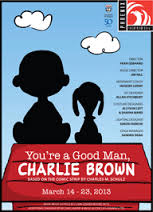You’re a Good Man, Charlie Brown
The Phoenix Theatre
Based on the comic strip “Peanuts” by Charles M. Schulz
Book, Music, and Lyrics by Clark Gesner
Directed by Fran Gebhard
Ends March 23
Reviewed by Leah Callen
From the first puffy cloud, there was something unsettling about this musical take on the Peanuts gang. As the characters sang, “You’re a good man, Charlie Brown,” they took turns slinging playful insults at him. Freud would have a field day with this play. The story is a strange sundae with childlike cheer and rousing musical numbers layered on top of existential angst. Characters struggle against childlike melancholy in the pursuit of happiness, as each ice cream scoop in their lives falls off the cone to the sidewalk. As Charlie suffers from unrequited love pangs for the Little Red-Haired Girl and bangs his head against a tree, Sally sees the futility in skipping, and Linus’s addiction to his blue blanket causes a full-blown Busby Berkeley-esque intervention. Lucy charges Charlie to console him, reminding us that friendship costs.
Like the comic strip upon which it is based, the story runs in a series of vignettes. The striking lighting, costumes, and set had a fantastic, surreal feel. Their sculpted, slick wigs reminded me of the homicidal, plasticine-haired people in the film Heavenly Creatures, a nice touch since these cartoon children are a strong mix of bitter and sweet. Live musical accompaniment on a grand piano, the energetic choreography, and musical numbers ranging from operatic to jazzy were the sprinkles and cherry on this musical treat.
Kale Penny sang with gentle artistry as the frustrated Charlie Brown. My childhood crush on dramatic, intellectual Schroeder remained intact. Derek Wallis wore that wig and conducted the rest of the cast masterfully in the number “Beethoven Day,” a staggered chorus piping out the composer’s Fifth-pure magic. Francis Melling played Linus like a depressed Buddha who is under-appreciated.
Kevin Eade’s Snoopy was a howl, exposing the dark underbelly of the cartoon canine as he confesses his secret desire to bite someone. He was the cool, aloof guy in the pack, a beagle beatnik. I really just wanted to pet his furry head. Snoopy’s suppertime serenade was sung with charismatic soul, like a puppy version of the Rum Tum Tugger. And Snoopy’s flying doghouse scene, as he cursed the Red Baron, was a highlight.
This play has a one-dimensional take on female characters, even for cartoons. Lucy and Sally are written as overbearing princesses constantly bullying others. In a classic scene, Tea Siskin as Lucy perches on Schroeder’s piano like a frilly barfly, trying to make him into the man of her dreams-every man’s nightmare. Christie Stewart was a spring as tightly wound as her yellow ringlets in the role of Sally. Both actresses are clearly talented singers. However, the intentional helium-squeak in their voices was a gimmick that wore thin for me; it only added to shrillness of their characterization. It limited them from truly showing off their voices while singing and I, frankly, worried about their vocal cords. The male leads did not have to suffer the same vocal gymnastics.
Athletic, forthright, Peppermint Patty, played by spritely Veronique Piercy, was the one female role that could have been a refreshing contrast to the stereotyping, but she never got to be centre-stage. I really wish she had. As amusing and imaginative as the play was, the story seemed to be less about Charlie and more of a comment on gender. This could be very clever if not for the sexist overtones. After a while, I was silently wishing Snoopy would lose control and bite someone. This version of the famous comic is a cynical one, but the song and dance are the delightful chocolate sauce that sweeten the bananas.
Leah Callen is a budding poet-playwright-screenwriter studying at the University of Victoria.
